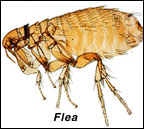
Fleas can be a big problem in Seattle due to the mild weather. Even indoor only pets need protection! Our Seattle Veterinary Hospital can help.
Fleas can cause problems for pets ranging from minor to life-threatening. Not only can these parasites cause severe itching, irritation, and allergies, but they can also transmit tapeworms and diseases. Fleas can infest dogs, cats, ferrets, mice, and rats. And fleas don’t just stay on pets; they can bite people, too.
 Fleas are generally a problem outdoors in the Seattle area during the spring, summer, and fall. Flea numbers increase throughout the warmer months and then try to work their way indoors due to the cold. It is possible to have a year round flea infestation, so checking for fleas on a regular basis and using year round flea prevention is critical. Female fleas can begin feeding on pets within minutes and lay 40-50 eggs per day. Do not wait to see fleas on your pet or in your home. Only 5% of the flea lifecycle is visible as adult fleas, the other 95% (eggs, larvae and pupae) maybe infesting your home but are not visible.
Fleas are generally a problem outdoors in the Seattle area during the spring, summer, and fall. Flea numbers increase throughout the warmer months and then try to work their way indoors due to the cold. It is possible to have a year round flea infestation, so checking for fleas on a regular basis and using year round flea prevention is critical. Female fleas can begin feeding on pets within minutes and lay 40-50 eggs per day. Do not wait to see fleas on your pet or in your home. Only 5% of the flea lifecycle is visible as adult fleas, the other 95% (eggs, larvae and pupae) maybe infesting your home but are not visible.
As veterinarians in Seattle, we recommend year round flea prevention.
- Year round flea prevention is critical to successfully control flea infestation and to break the flea lifecycle. Missing monthly applications allow fleas to produce hundreds of eggs that will hatch in the environment and sustain the infestation.
- All pets living in the household should be treated. Use one full dose on each pet. Flea treatment products are cat and dog specific as well as weight specific. Be sure you are using the appropriate product. Hawthorne Hills’ veterinarians and staff can help you select the best product for your pet and your family. Please call us today.
- Inspect your pet’s hair coat regularly (at least once a week) for evidence of fleas, flea droppings (“flea dirt”), or skin sores. Scratching frequently can be a sign of flea infestation. Using a flea comb, or other fine-toothed comb can help in the retrieval of fleas and/or flea dirt. Pay attention to the areas around the tail and lower back, as these are favorite flea locations.
- Use a flea shampoo, or basic cleansing shampoo to rid your pet of excess dander and hair. Regular grooming is important to healthy skin, and will help discourage fleas from setting up house. Pets that have “flea bite dermatitis” may benefit from medicated shampoos. Ask us for advice.
- Many people think they only need to treat their pet during “flea season”. However, fleas are active year round in Seattle, and especially common in the Fall after a warm summer. Don’t wait until you are seeing fleas to start a flea prevention program. Once the fleas are present, it will take several months for you to eradicate an infestation. Prevention is much easier for everyone.
Do you already have a flea problem?
- It can take at least 6-8 weeks for all of the flea developmental stages to be exhausted; do not stop treatments just because you have not seen a flea. The adult flea comprises only 5% of the flea population; what you don’t see are the eggs, larvae, and pupae. These stages can be many places – in your house, your furniture, your car, your yard. The development from egg to adult is variable. The adult flea emerges from the pupa anywhere from 4 days to 6-12 months – hence fleas have a 14-day to 12-month lifecycle.
- Take into account additional common sources that may re-infest your pet with fleas and try to control your pet’s contact with these sources. Untreated neighbor pets and urban wildlife, particularly opossums and raccoons, can be a source of flea egg contamination in your yard or in parks and other public areas. Fleas eggs and larval stage can be tracked in on your shoes, and pets can pick them up while playing outside and carry them into your home.
- Regular vacuuming of your home and laundering of bedding and linens can reduce the flea population. Make sure to empty the vacuum bag after cleaning in a secure garbage can outside of your home.

